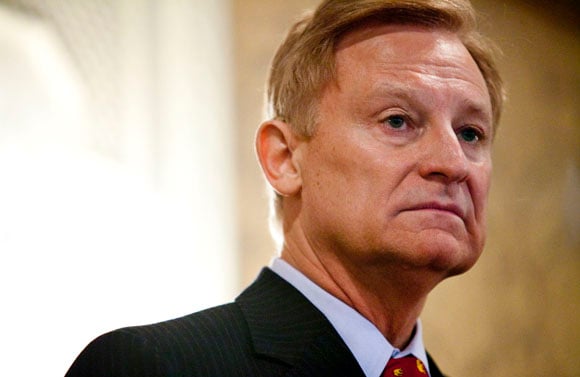A draft of a bill that would establish a self-regulatory organization for investment advisers was released today by House Financial Services Committee Chairman Spencer Bachus, R-Ala., in advance of Tuesday's hearing by the House Capital Markets Subcommittee.
A draft of a bill that would establish a self-regulatory organization for investment advisers was released today by House Financial Services Committee Chairman Spencer Bachus, R-Ala.
The draft was released in advance of Tuesday's hearing by the House Capital Markets Subcommittee on two key adviser issues — fiduciary duty for investment advice and adviser oversight.
Mr. Bachus' draft bill does not specify a particular body to be designated as a regulator, but would require advisers to be members of such an entity, which would report to the Securities and Exchange Commission. The draft also states that more than one adviser SRO could be established.
In a press conference, Mr. Bachus said that his legislation effectively chooses the SRO route as the best way to increase the number of advisers who are reviewed annually.
In a report early this year, the SEC acknowledged that it examines only about 9% of advisers each year because of a lack of resources. It gave Congress three options for increasing oversight: establish an SRO, allow the SEC to levy user fees for examinations or extend the reach of the Financial Industry Regulatory Authority Inc. to include advisers who are dually registered as broker-dealers.
Mr. Bachus said that his bill would help prevent another financial fraud like the one perpetrated by Bernard Madoff, whose Ponzi scheme bilked investors out of $65 billion. In previous statements, Mr. Bachus has said that Finra was able to investigate only the broker-dealer side of the Madoff operations while the crime was perpetrated by Madoff's investment-adviser operation.
Although Finra is not mentioned in the draft legislation, Mr. Bachus promoted the broker-dealer regulator in his comments today.
“Had Finra been on the job, I don't think we would have seen that,” Mr. Bachus said in reference to the Madoff scandal. “Instead of an examination every 10 years, as was the case with Madoff, [an adviser SRO] would result in more-effective regulation and examinations.”
The idea of an SRO is anathema to most advisers, especially if it turns out to be Finra. Advisers worry that the organization, which enforces the suitability standard on broker-dealers, wouldn't be able to appropriately handle the fiduciary standard to which advisers must adhere.
Finra has said repeatedly that if it becomes an adviser SRO, it would establish a separate governance structure that is responsive to the characteristics of the adviser sector.
The Financial Services Institute has been backing Finra as the adviser SRO. It will now try to rally congressional support for Mr. Bachus' bill, which it says will give advisers a level of regulatory scrutiny comparable to broker-dealers.
“The current regulatory disparity not only puts investors at great risk, it undermines investor confidence, which in turn jeopardizes not only the investment goals of millions of Americans but also the economy at large,” FSI president and chief executive Dale Brown said in a statement. “Since the start of the legislative process that resulted in [the] Dodd-Frank [Act], FSI has urged Congress to adopt legislation that would allow the SEC to close the regulatory gap by approving an SRO for retail investment advisers. If adopted, this legislation would accomplish that goal and bring about significant improvements in investor protection and a balanced playing field for all financial advisers.”







